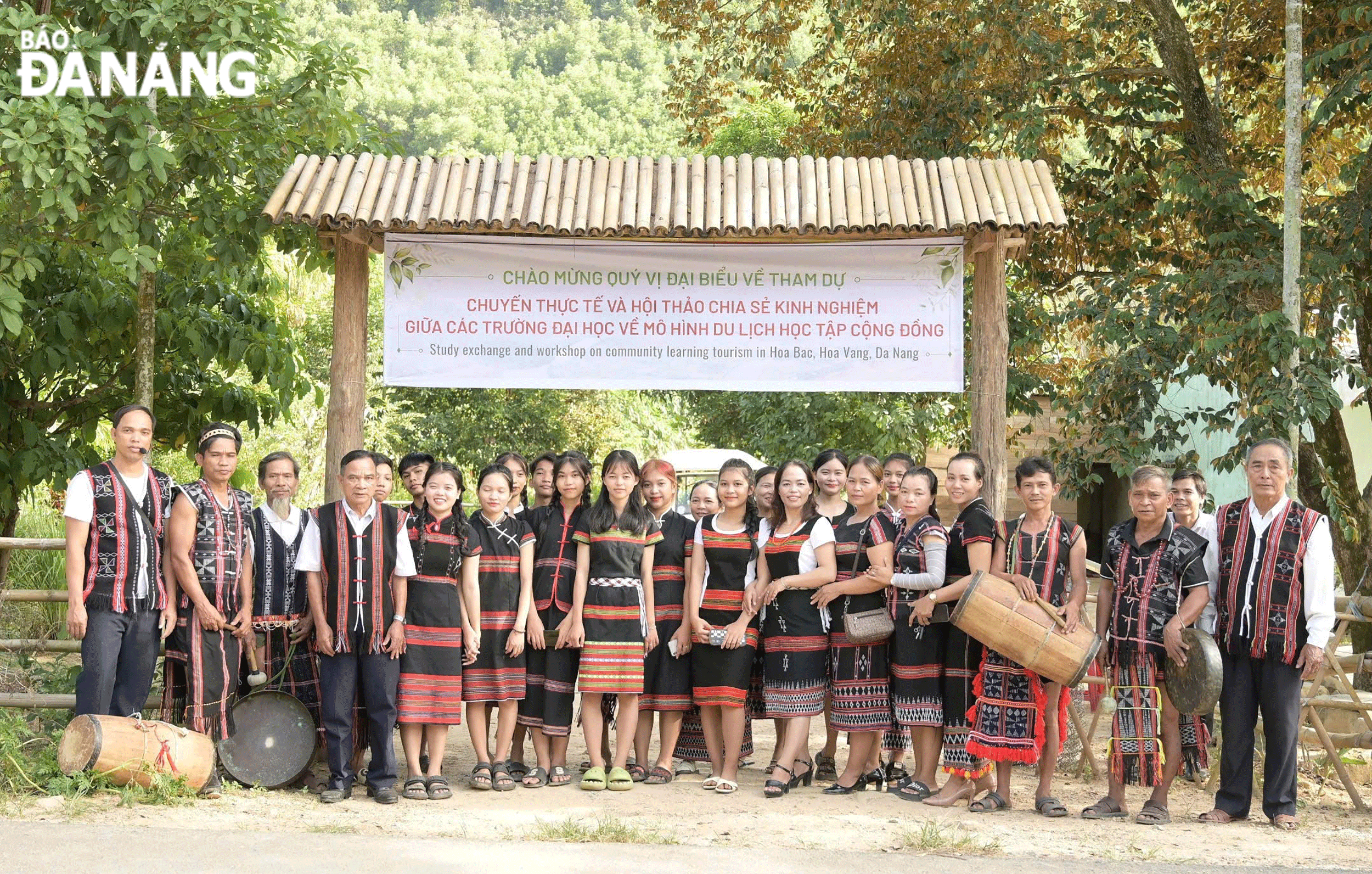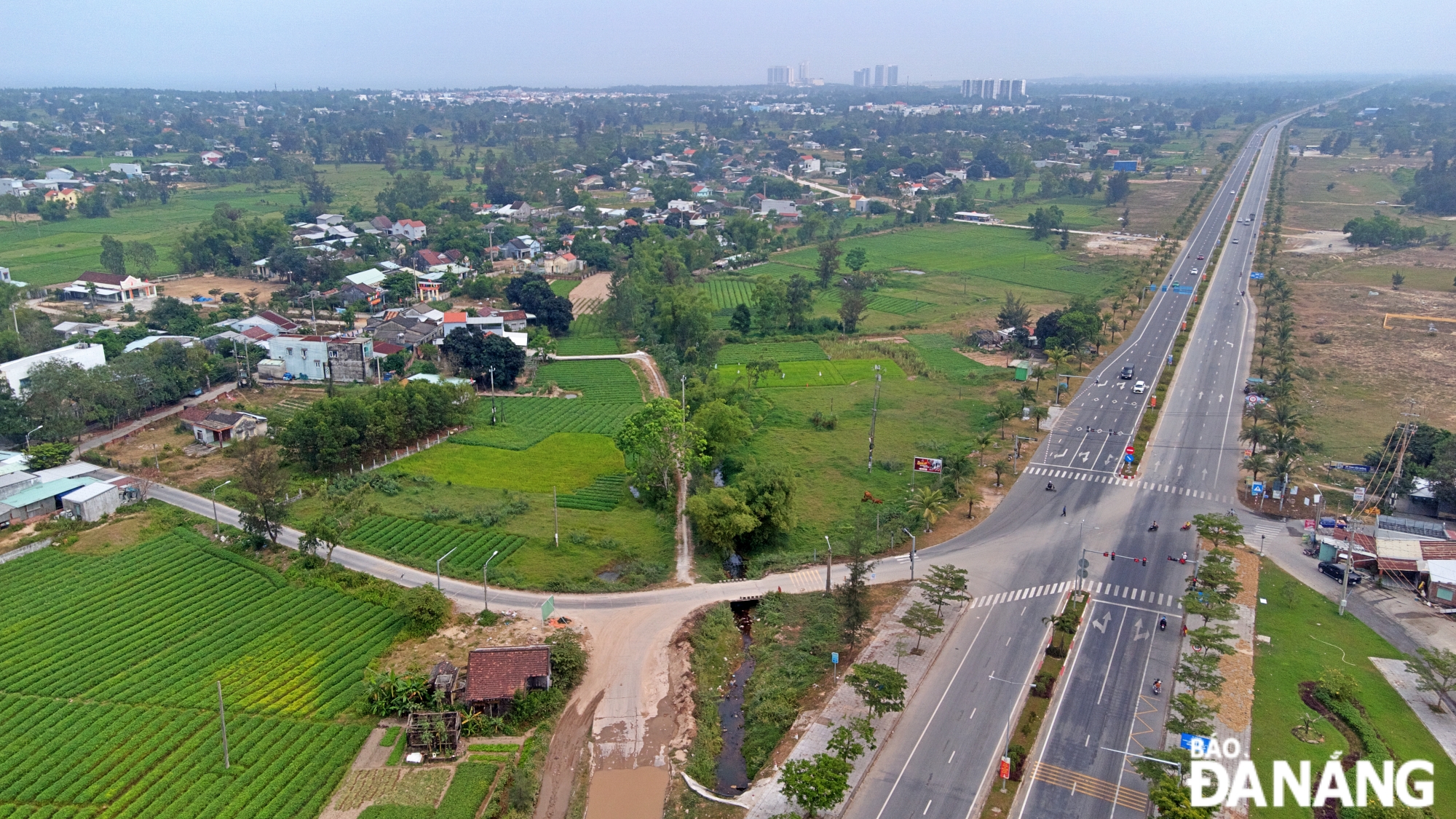Da Nang boosts collective economy development
The collective economy, with cooperatives as its core, in Da Nang has seen significant growth, contributing to job creation and promoting the local socio-economy. However, to achieve sustainable and comprehensive development, it is necessary to implement various solutions to maximise the potential and advantages of cooperatives.
 |
| Tourists experiencing the culture of the Co Tu people in Hoa Vang District. Photo: TRAN TRUC |
Substantial development
Established in early 2024 with 8 members, the Thanh Khe Clean Agricultural Products Cooperative (Thanh Khe district) raises 2,500 chickens and more than 100 pigs on an area of over 4 hectares in Hoa Ninh Commune, Hoa Vang District. In addition to strictly following the production process, the Cooperative also chooses to use suitable breeds and animal feed in a bid to develop a model of clean and sustainable agricultural production in the locality.
Mr. Tran Cong Minh, Head of the Cooperative, said every day, the Cooperative supplies approximately 100 kg of meat to the market. The income for each member is nearly VND 10 million per month. One of the main advantages of the cooperative is its focus on clean and natural food, minimising the use of industrial products. Additionally, the cooperative has established planned food-growing areas to ensure a proactive supply of local produce. Currently, the consumption of products has stabilised, allowing the cooperative to expand production and research seed production to achieve self-sufficiency in supply, while also aiming to meet VietGAP standards.
Meanwhile, the Hoa Bac Ecological Agriculture and Community Tourism Cooperative based in Hoa Vang District has implemented many topics for sightseeing and learning about community tourism, sustainable agriculture and forestry and the culture of the Co Tu people. These activities attract more than 5,000 visitors, including classes of pupils, students and delegations from many provinces and cities in the country.
Director of the Cooperative Do Thi Huyen Tram stated “Our goal is to maximise the community's role as the main focus. Every individual is a key player in connecting, cooperating, and discussing ways to build and manage tourism activities that serve our visitors. Currently, the Cooperative has established a network consisting of 19 official members and nearly 200 affiliated members, including 95 Co Tu women. We have supported the construction of 10 model gardens and 4 water-retaining hill models in the area. Additionally, we are implementing ecological farming and livestock models that not only provide educational and sightseeing opportunities but also supply fresh ingredients for meals served to tourists. In the near future, the Cooperative plans to organise tours for sightseeing and learning in the Cu De River basin”.
The Tuy Loan Safe Vegetable Production and Consumption Service Cooperative, located in Hoa Phong Commune, Hoa Vang District, consists of 40 member households cultivating a total area of 6 hectares. They grow 43 different types of vegetables and fruits, producing over 350 tonnes per year. The average monthly income for each household ranges from VND 5.5 to VND 6 million.
Mr. Nguyen Van Tan, Director of the Cooperative, said that he is gradually investing and consolidating items serving production and product consumption to meet market demand. The Cooperative's products are consumed in many supermarket systems and safe food stores in the city. The Cooperative also develops its own brands and trademarks with QR codes so that consumers can easily trace the origin of the products.
In the coming time, the Cooperative will enhance its experience in vegetable growing by integrating production and business activities. It will expand the hydroponic growing area by 1,000m2, creating jobs for 50 regular workers and increasing revenue by 10%.
Further improving quality
Vice Chairman of Hoa Vang District People's Committee Phan Duy Anh said that in 2024, the locality established three new cooperatives, bringing the total number of cooperatives in the area to 42. Of which, agricultural cooperatives account for a large proportion with 34 cooperatives. They play an important role in providing essential services such as irrigation, supplying seeds and agricultural and forestry materials, consuming products, transferring technical advances, land preparation, and developing community-based ecotourism.
These activities not only meet the needs of cooperative members but also contribute to creating jobs for rural workers and promoting socio-economic development in the locality.
The district will continue to promote the establishment of new collective economic units, create conditions for cooperatives to participate in programmes and projects in the area, build new cooperative models in each commune, and support cooperatives in the stages of product consumption, access to capital, technology, and land.
Moreover, the district provides guidance and support to cooperatives for investing in modern machinery and equipment. This approach facilitates the shift from producing raw materials to creating high-value products that meet market demand. To further enhance competitiveness, the district will implement solutions such as investing in packaging, improving packaging design, and enhancing overall product design and quality.
Currently, there are 160 cooperatives in the city, with 13 newly established in 2024. The total charter capital of these cooperatives exceeds VND 417 billion and they have attracted 9,599 members, creating jobs for 15,111 workers.
According to Pham Cong Chinh, the Chairman of the Da Nang Cooperative Union, the cooperatives have actively embraced digital transformation and applied information technology to their production and business activities. As a result, labor productivity has been improved, and access to markets has significantly increased.
Notably, many new cooperatives have been established by young people with qualifications and enthusiasm. These cooperatives have become research and learning destinations for working delegations inside and outside the city. Cooperatives have also coordinated with local authorities many times to effectively implement policies and strategies to restructure the agricultural sector, build new rural areas and solve social problems. However, in addition to positive results, the scale and production capacity of the collective economic sector and cooperatives in the city still have many limitations. The number of cooperatives operating is not commensurate with the city's potential as well as the output supplied to the market is still modest.
In 2025, the Da Nang Cooperative Union will strive to establish 15 new cooperatives and 35 cooperative groups. To promote product consumption, the municipal Cooperative Union focuses on organizing small and medium-sized markets specialising in selling cooperatives’ products, as well as creating conditions for cooperatives and members to participate in trade fairs and exhibitions inside and outside the city.
Reporting by TRAN TRUC - Translating by M.DUNG








